Elderly People with Dementia and Their Vulnerability
VerifiedAdded on 2022/11/09
|15
|4273
|120
AI Summary
This essay discusses the vulnerability of elderly people with dementia in healthcare, social determinants, health inequities, health outcomes, and health disparities. It also recommends a policy to enhance care for the elderly population in Australia.
Contribute Materials
Your contribution can guide someone’s learning journey. Share your
documents today.
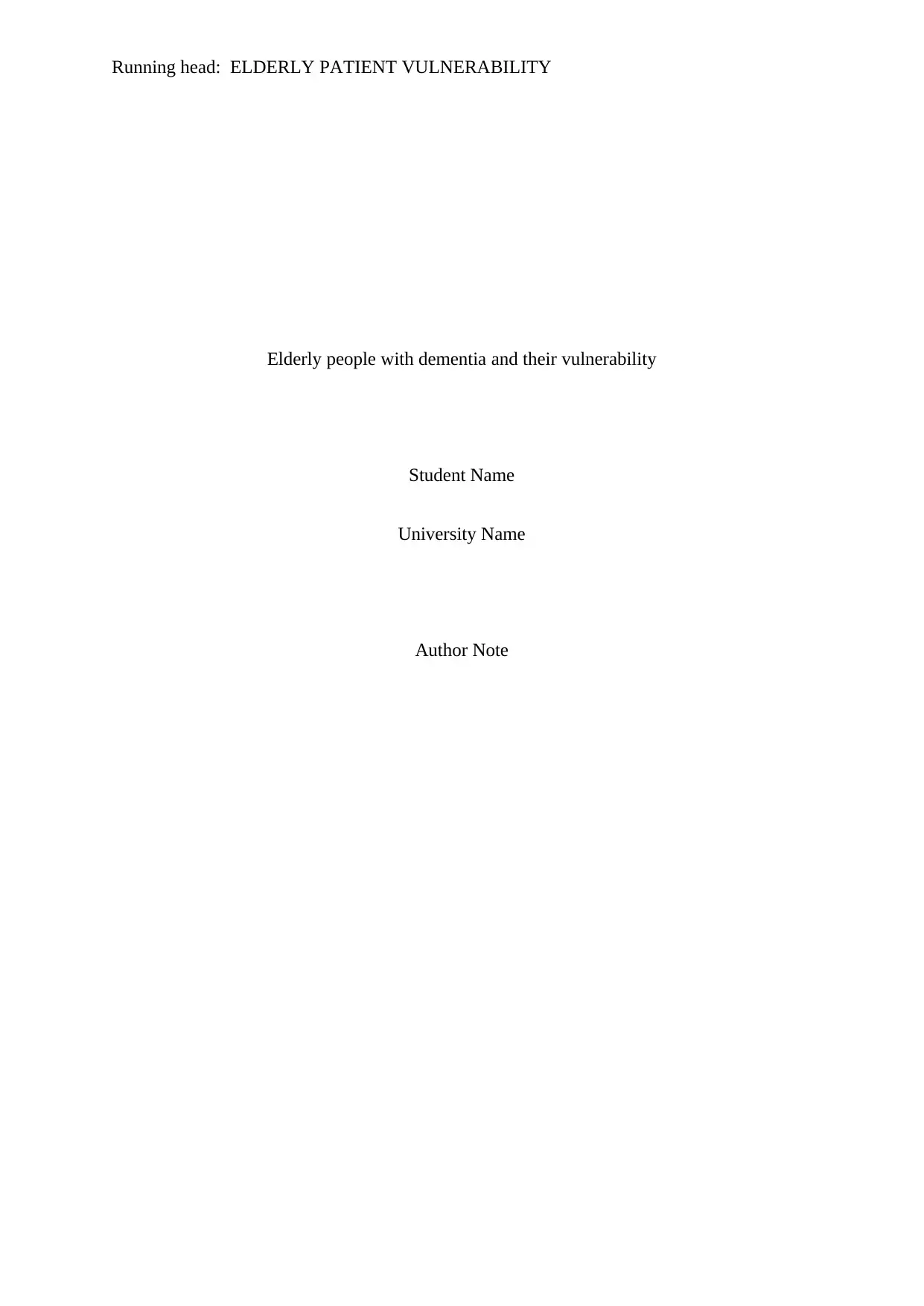
Running head: ELDERLY PATIENT VULNERABILITY
Elderly people with dementia and their vulnerability
Student Name
University Name
Author Note
Elderly people with dementia and their vulnerability
Student Name
University Name
Author Note
Secure Best Marks with AI Grader
Need help grading? Try our AI Grader for instant feedback on your assignments.
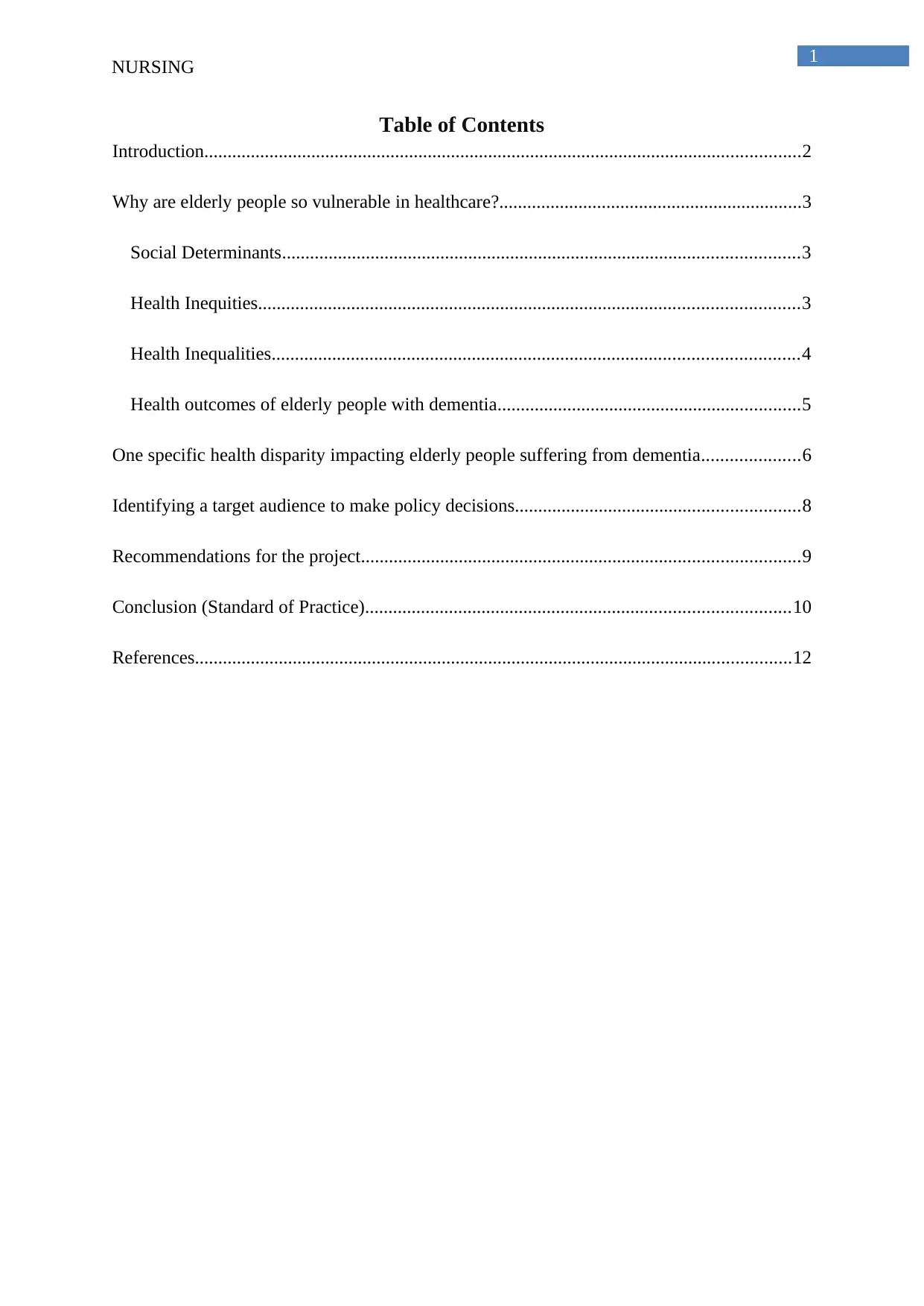
1
NURSING
Table of Contents
Introduction................................................................................................................................2
Why are elderly people so vulnerable in healthcare?.................................................................3
Social Determinants...............................................................................................................3
Health Inequities....................................................................................................................3
Health Inequalities.................................................................................................................4
Health outcomes of elderly people with dementia.................................................................5
One specific health disparity impacting elderly people suffering from dementia.....................6
Identifying a target audience to make policy decisions.............................................................8
Recommendations for the project..............................................................................................9
Conclusion (Standard of Practice)...........................................................................................10
References................................................................................................................................12
NURSING
Table of Contents
Introduction................................................................................................................................2
Why are elderly people so vulnerable in healthcare?.................................................................3
Social Determinants...............................................................................................................3
Health Inequities....................................................................................................................3
Health Inequalities.................................................................................................................4
Health outcomes of elderly people with dementia.................................................................5
One specific health disparity impacting elderly people suffering from dementia.....................6
Identifying a target audience to make policy decisions.............................................................8
Recommendations for the project..............................................................................................9
Conclusion (Standard of Practice)...........................................................................................10
References................................................................................................................................12
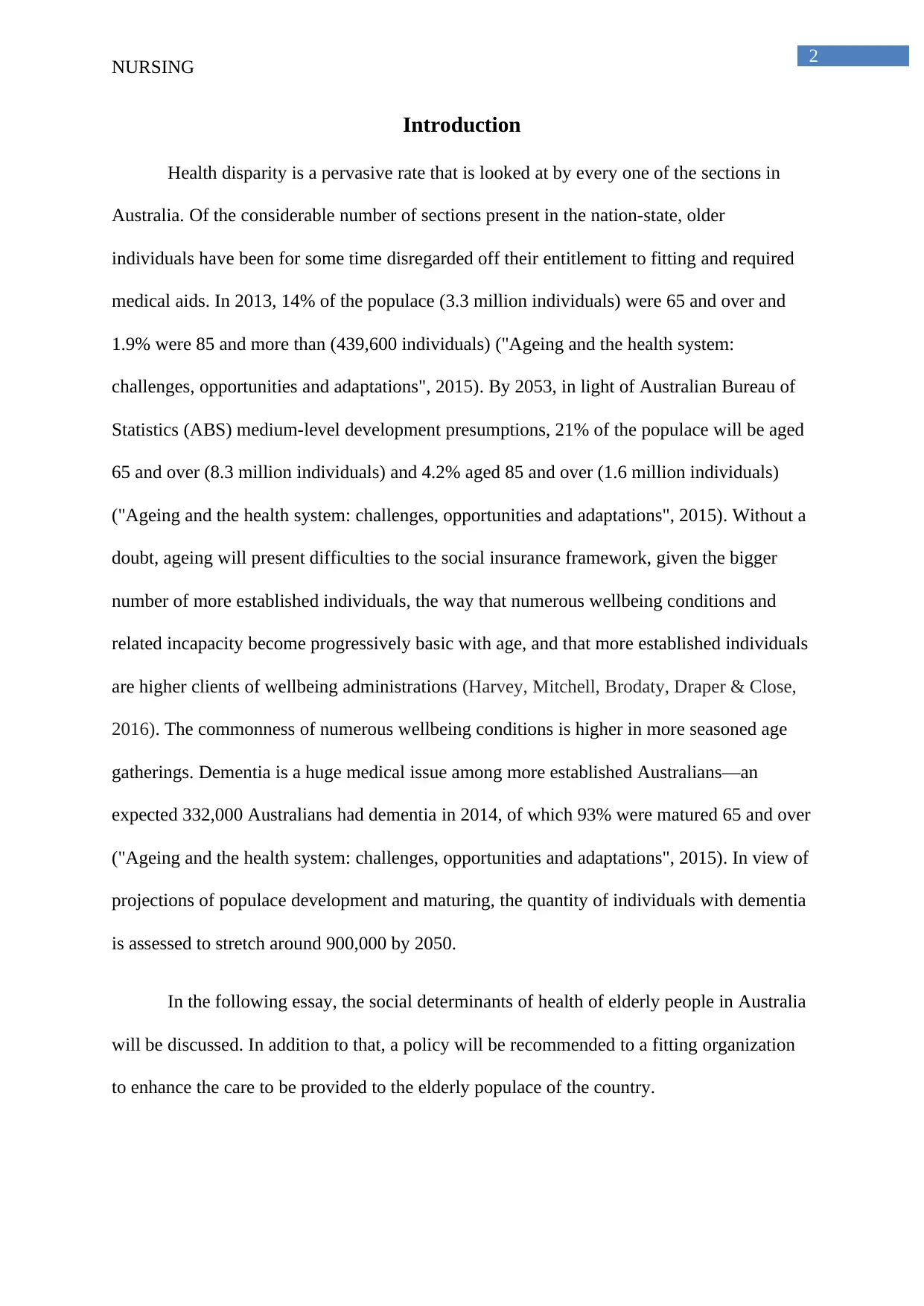
2
NURSING
Introduction
Health disparity is a pervasive rate that is looked at by every one of the sections in
Australia. Of the considerable number of sections present in the nation-state, older
individuals have been for some time disregarded off their entitlement to fitting and required
medical aids. In 2013, 14% of the populace (3.3 million individuals) were 65 and over and
1.9% were 85 and more than (439,600 individuals) ("Ageing and the health system:
challenges, opportunities and adaptations", 2015). By 2053, in light of Australian Bureau of
Statistics (ABS) medium-level development presumptions, 21% of the populace will be aged
65 and over (8.3 million individuals) and 4.2% aged 85 and over (1.6 million individuals)
("Ageing and the health system: challenges, opportunities and adaptations", 2015). Without a
doubt, ageing will present difficulties to the social insurance framework, given the bigger
number of more established individuals, the way that numerous wellbeing conditions and
related incapacity become progressively basic with age, and that more established individuals
are higher clients of wellbeing administrations (Harvey, Mitchell, Brodaty, Draper & Close,
2016). The commonness of numerous wellbeing conditions is higher in more seasoned age
gatherings. Dementia is a huge medical issue among more established Australians—an
expected 332,000 Australians had dementia in 2014, of which 93% were matured 65 and over
("Ageing and the health system: challenges, opportunities and adaptations", 2015). In view of
projections of populace development and maturing, the quantity of individuals with dementia
is assessed to stretch around 900,000 by 2050.
In the following essay, the social determinants of health of elderly people in Australia
will be discussed. In addition to that, a policy will be recommended to a fitting organization
to enhance the care to be provided to the elderly populace of the country.
NURSING
Introduction
Health disparity is a pervasive rate that is looked at by every one of the sections in
Australia. Of the considerable number of sections present in the nation-state, older
individuals have been for some time disregarded off their entitlement to fitting and required
medical aids. In 2013, 14% of the populace (3.3 million individuals) were 65 and over and
1.9% were 85 and more than (439,600 individuals) ("Ageing and the health system:
challenges, opportunities and adaptations", 2015). By 2053, in light of Australian Bureau of
Statistics (ABS) medium-level development presumptions, 21% of the populace will be aged
65 and over (8.3 million individuals) and 4.2% aged 85 and over (1.6 million individuals)
("Ageing and the health system: challenges, opportunities and adaptations", 2015). Without a
doubt, ageing will present difficulties to the social insurance framework, given the bigger
number of more established individuals, the way that numerous wellbeing conditions and
related incapacity become progressively basic with age, and that more established individuals
are higher clients of wellbeing administrations (Harvey, Mitchell, Brodaty, Draper & Close,
2016). The commonness of numerous wellbeing conditions is higher in more seasoned age
gatherings. Dementia is a huge medical issue among more established Australians—an
expected 332,000 Australians had dementia in 2014, of which 93% were matured 65 and over
("Ageing and the health system: challenges, opportunities and adaptations", 2015). In view of
projections of populace development and maturing, the quantity of individuals with dementia
is assessed to stretch around 900,000 by 2050.
In the following essay, the social determinants of health of elderly people in Australia
will be discussed. In addition to that, a policy will be recommended to a fitting organization
to enhance the care to be provided to the elderly populace of the country.
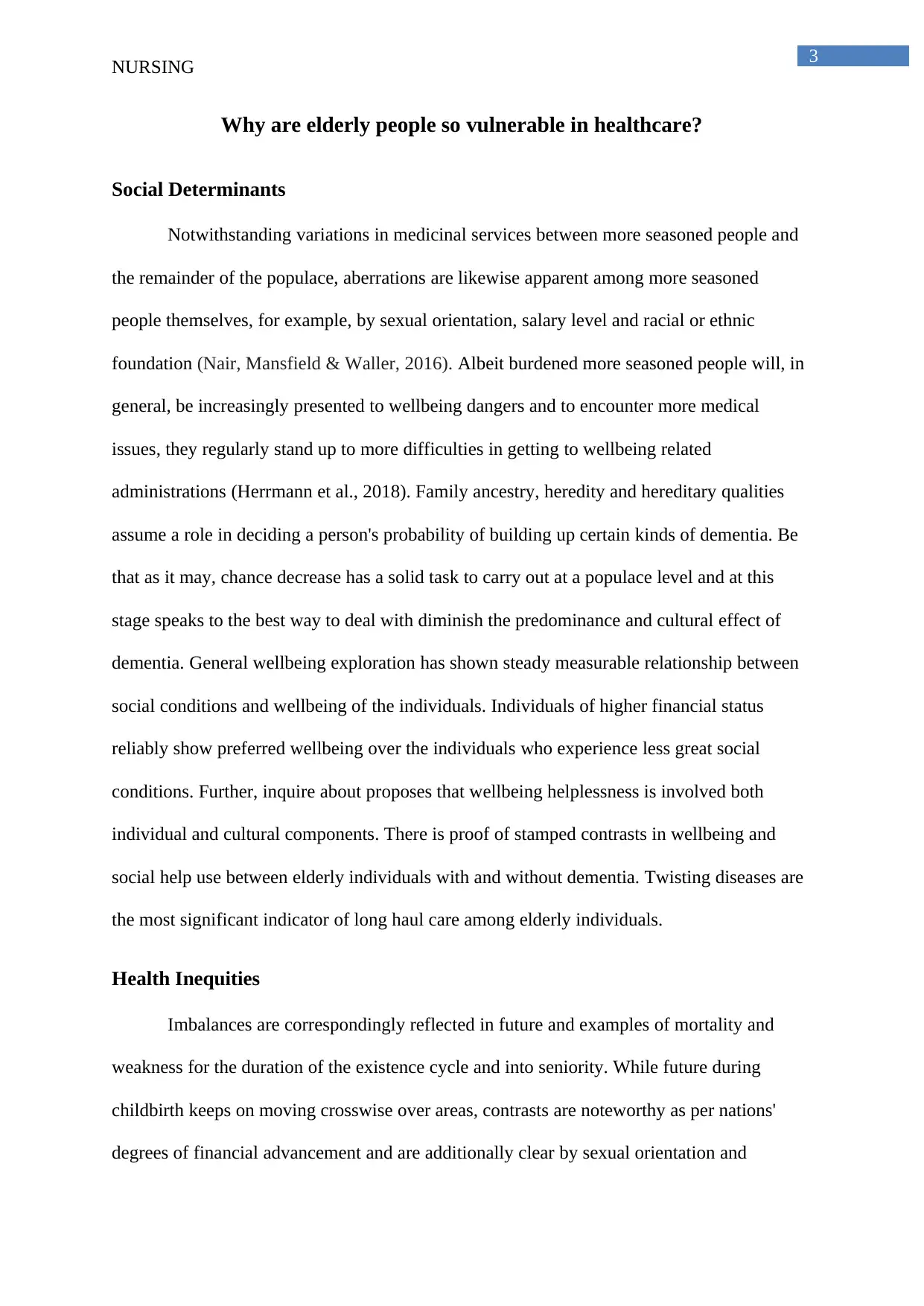
3
NURSING
Why are elderly people so vulnerable in healthcare?
Social Determinants
Notwithstanding variations in medicinal services between more seasoned people and
the remainder of the populace, aberrations are likewise apparent among more seasoned
people themselves, for example, by sexual orientation, salary level and racial or ethnic
foundation (Nair, Mansfield & Waller, 2016). Albeit burdened more seasoned people will, in
general, be increasingly presented to wellbeing dangers and to encounter more medical
issues, they regularly stand up to more difficulties in getting to wellbeing related
administrations (Herrmann et al., 2018). Family ancestry, heredity and hereditary qualities
assume a role in deciding a person's probability of building up certain kinds of dementia. Be
that as it may, chance decrease has a solid task to carry out at a populace level and at this
stage speaks to the best way to deal with diminish the predominance and cultural effect of
dementia. General wellbeing exploration has shown steady measurable relationship between
social conditions and wellbeing of the individuals. Individuals of higher financial status
reliably show preferred wellbeing over the individuals who experience less great social
conditions. Further, inquire about proposes that wellbeing helplessness is involved both
individual and cultural components. There is proof of stamped contrasts in wellbeing and
social help use between elderly individuals with and without dementia. Twisting diseases are
the most significant indicator of long haul care among elderly individuals.
Health Inequities
Imbalances are correspondingly reflected in future and examples of mortality and
weakness for the duration of the existence cycle and into seniority. While future during
childbirth keeps on moving crosswise over areas, contrasts are noteworthy as per nations'
degrees of financial advancement and are additionally clear by sexual orientation and
NURSING
Why are elderly people so vulnerable in healthcare?
Social Determinants
Notwithstanding variations in medicinal services between more seasoned people and
the remainder of the populace, aberrations are likewise apparent among more seasoned
people themselves, for example, by sexual orientation, salary level and racial or ethnic
foundation (Nair, Mansfield & Waller, 2016). Albeit burdened more seasoned people will, in
general, be increasingly presented to wellbeing dangers and to encounter more medical
issues, they regularly stand up to more difficulties in getting to wellbeing related
administrations (Herrmann et al., 2018). Family ancestry, heredity and hereditary qualities
assume a role in deciding a person's probability of building up certain kinds of dementia. Be
that as it may, chance decrease has a solid task to carry out at a populace level and at this
stage speaks to the best way to deal with diminish the predominance and cultural effect of
dementia. General wellbeing exploration has shown steady measurable relationship between
social conditions and wellbeing of the individuals. Individuals of higher financial status
reliably show preferred wellbeing over the individuals who experience less great social
conditions. Further, inquire about proposes that wellbeing helplessness is involved both
individual and cultural components. There is proof of stamped contrasts in wellbeing and
social help use between elderly individuals with and without dementia. Twisting diseases are
the most significant indicator of long haul care among elderly individuals.
Health Inequities
Imbalances are correspondingly reflected in future and examples of mortality and
weakness for the duration of the existence cycle and into seniority. While future during
childbirth keeps on moving crosswise over areas, contrasts are noteworthy as per nations'
degrees of financial advancement and are additionally clear by sexual orientation and
Secure Best Marks with AI Grader
Need help grading? Try our AI Grader for instant feedback on your assignments.
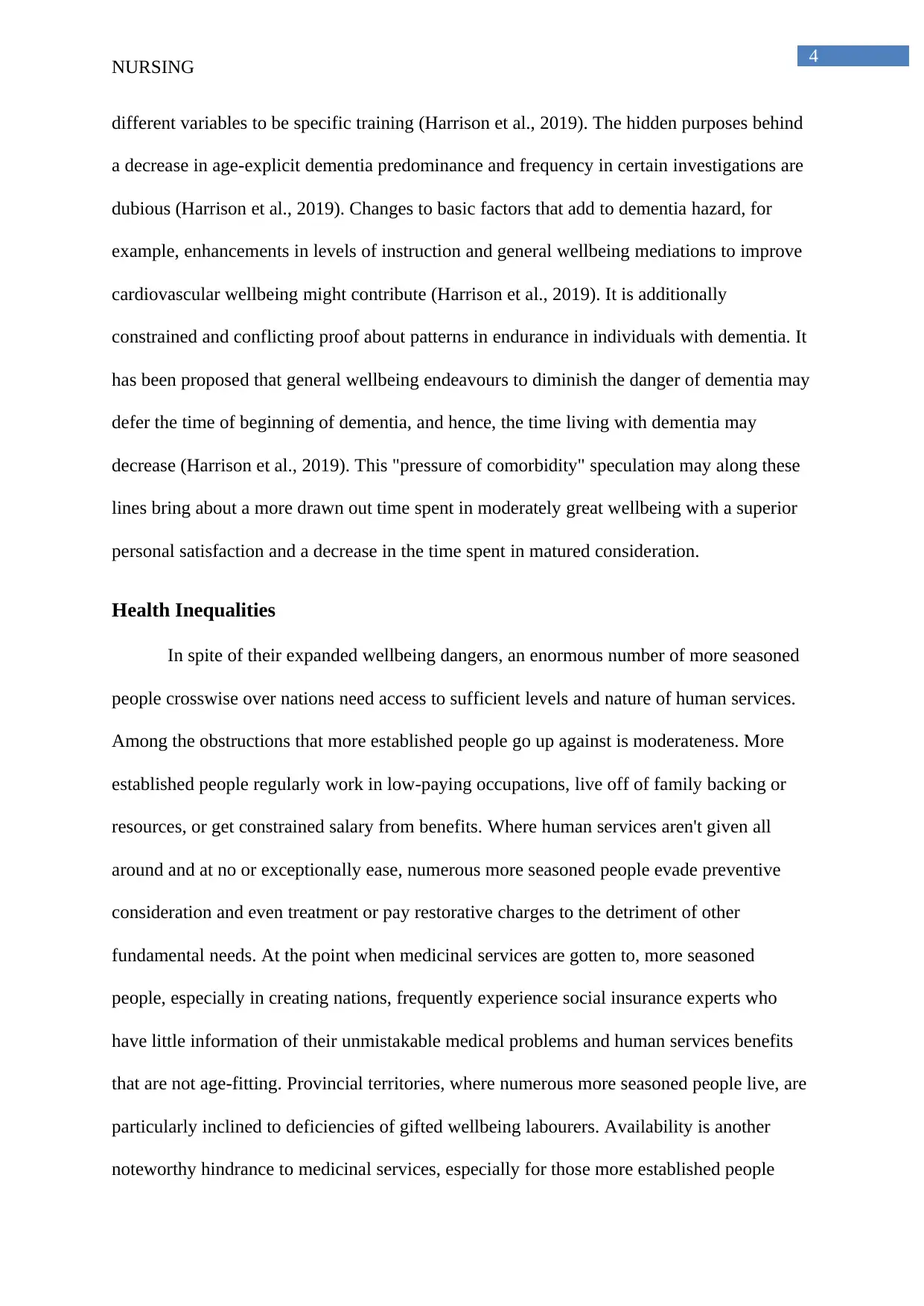
4
NURSING
different variables to be specific training (Harrison et al., 2019). The hidden purposes behind
a decrease in age-explicit dementia predominance and frequency in certain investigations are
dubious (Harrison et al., 2019). Changes to basic factors that add to dementia hazard, for
example, enhancements in levels of instruction and general wellbeing mediations to improve
cardiovascular wellbeing might contribute (Harrison et al., 2019). It is additionally
constrained and conflicting proof about patterns in endurance in individuals with dementia. It
has been proposed that general wellbeing endeavours to diminish the danger of dementia may
defer the time of beginning of dementia, and hence, the time living with dementia may
decrease (Harrison et al., 2019). This "pressure of comorbidity" speculation may along these
lines bring about a more drawn out time spent in moderately great wellbeing with a superior
personal satisfaction and a decrease in the time spent in matured consideration.
Health Inequalities
In spite of their expanded wellbeing dangers, an enormous number of more seasoned
people crosswise over nations need access to sufficient levels and nature of human services.
Among the obstructions that more established people go up against is moderateness. More
established people regularly work in low-paying occupations, live off of family backing or
resources, or get constrained salary from benefits. Where human services aren't given all
around and at no or exceptionally ease, numerous more seasoned people evade preventive
consideration and even treatment or pay restorative charges to the detriment of other
fundamental needs. At the point when medicinal services are gotten to, more seasoned
people, especially in creating nations, frequently experience social insurance experts who
have little information of their unmistakable medical problems and human services benefits
that are not age-fitting. Provincial territories, where numerous more seasoned people live, are
particularly inclined to deficiencies of gifted wellbeing labourers. Availability is another
noteworthy hindrance to medicinal services, especially for those more established people
NURSING
different variables to be specific training (Harrison et al., 2019). The hidden purposes behind
a decrease in age-explicit dementia predominance and frequency in certain investigations are
dubious (Harrison et al., 2019). Changes to basic factors that add to dementia hazard, for
example, enhancements in levels of instruction and general wellbeing mediations to improve
cardiovascular wellbeing might contribute (Harrison et al., 2019). It is additionally
constrained and conflicting proof about patterns in endurance in individuals with dementia. It
has been proposed that general wellbeing endeavours to diminish the danger of dementia may
defer the time of beginning of dementia, and hence, the time living with dementia may
decrease (Harrison et al., 2019). This "pressure of comorbidity" speculation may along these
lines bring about a more drawn out time spent in moderately great wellbeing with a superior
personal satisfaction and a decrease in the time spent in matured consideration.
Health Inequalities
In spite of their expanded wellbeing dangers, an enormous number of more seasoned
people crosswise over nations need access to sufficient levels and nature of human services.
Among the obstructions that more established people go up against is moderateness. More
established people regularly work in low-paying occupations, live off of family backing or
resources, or get constrained salary from benefits. Where human services aren't given all
around and at no or exceptionally ease, numerous more seasoned people evade preventive
consideration and even treatment or pay restorative charges to the detriment of other
fundamental needs. At the point when medicinal services are gotten to, more seasoned
people, especially in creating nations, frequently experience social insurance experts who
have little information of their unmistakable medical problems and human services benefits
that are not age-fitting. Provincial territories, where numerous more seasoned people live, are
particularly inclined to deficiencies of gifted wellbeing labourers. Availability is another
noteworthy hindrance to medicinal services, especially for those more established people
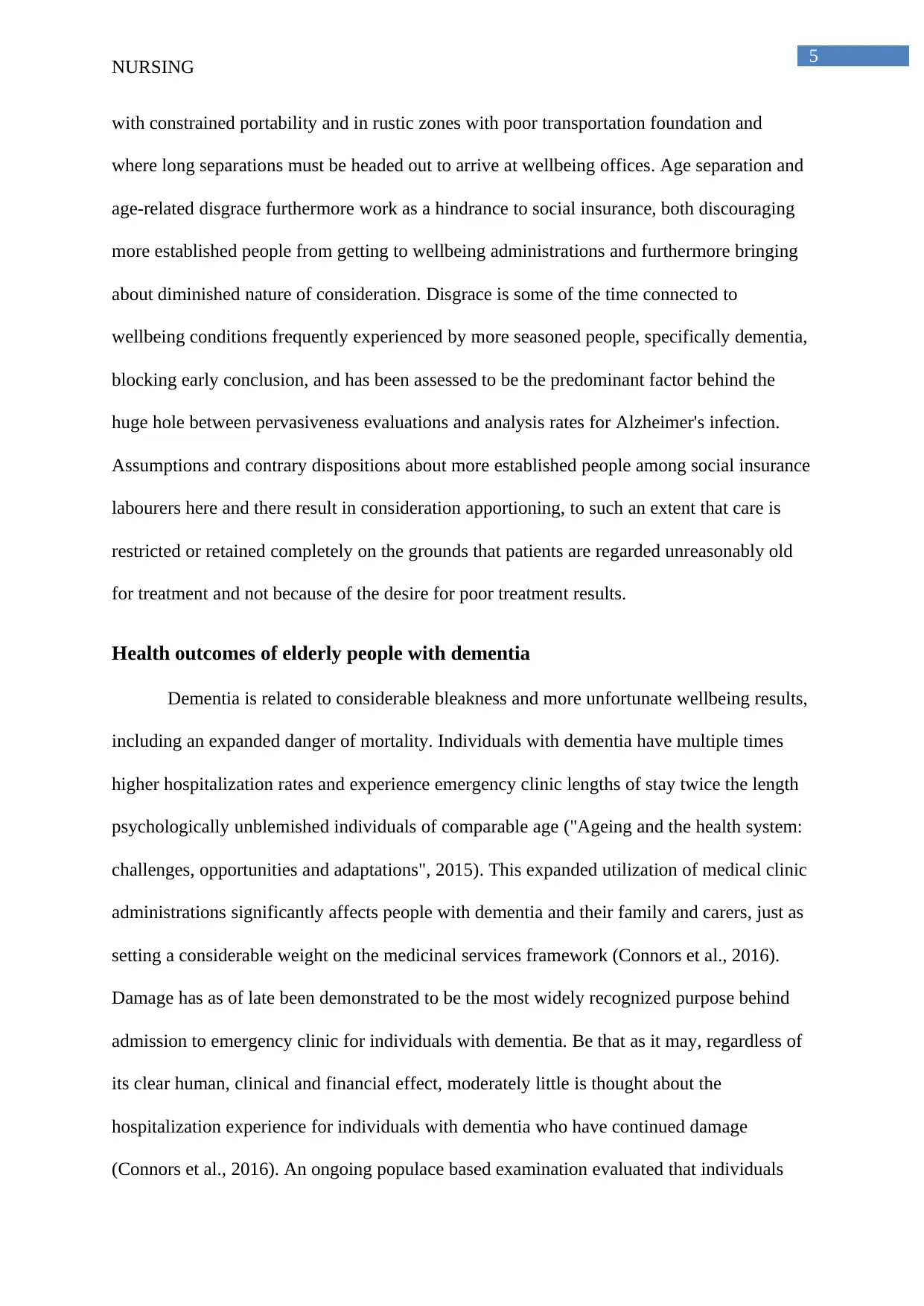
5
NURSING
with constrained portability and in rustic zones with poor transportation foundation and
where long separations must be headed out to arrive at wellbeing offices. Age separation and
age-related disgrace furthermore work as a hindrance to social insurance, both discouraging
more established people from getting to wellbeing administrations and furthermore bringing
about diminished nature of consideration. Disgrace is some of the time connected to
wellbeing conditions frequently experienced by more seasoned people, specifically dementia,
blocking early conclusion, and has been assessed to be the predominant factor behind the
huge hole between pervasiveness evaluations and analysis rates for Alzheimer's infection.
Assumptions and contrary dispositions about more established people among social insurance
labourers here and there result in consideration apportioning, to such an extent that care is
restricted or retained completely on the grounds that patients are regarded unreasonably old
for treatment and not because of the desire for poor treatment results.
Health outcomes of elderly people with dementia
Dementia is related to considerable bleakness and more unfortunate wellbeing results,
including an expanded danger of mortality. Individuals with dementia have multiple times
higher hospitalization rates and experience emergency clinic lengths of stay twice the length
psychologically unblemished individuals of comparable age ("Ageing and the health system:
challenges, opportunities and adaptations", 2015). This expanded utilization of medical clinic
administrations significantly affects people with dementia and their family and carers, just as
setting a considerable weight on the medicinal services framework (Connors et al., 2016).
Damage has as of late been demonstrated to be the most widely recognized purpose behind
admission to emergency clinic for individuals with dementia. Be that as it may, regardless of
its clear human, clinical and financial effect, moderately little is thought about the
hospitalization experience for individuals with dementia who have continued damage
(Connors et al., 2016). An ongoing populace based examination evaluated that individuals
NURSING
with constrained portability and in rustic zones with poor transportation foundation and
where long separations must be headed out to arrive at wellbeing offices. Age separation and
age-related disgrace furthermore work as a hindrance to social insurance, both discouraging
more established people from getting to wellbeing administrations and furthermore bringing
about diminished nature of consideration. Disgrace is some of the time connected to
wellbeing conditions frequently experienced by more seasoned people, specifically dementia,
blocking early conclusion, and has been assessed to be the predominant factor behind the
huge hole between pervasiveness evaluations and analysis rates for Alzheimer's infection.
Assumptions and contrary dispositions about more established people among social insurance
labourers here and there result in consideration apportioning, to such an extent that care is
restricted or retained completely on the grounds that patients are regarded unreasonably old
for treatment and not because of the desire for poor treatment results.
Health outcomes of elderly people with dementia
Dementia is related to considerable bleakness and more unfortunate wellbeing results,
including an expanded danger of mortality. Individuals with dementia have multiple times
higher hospitalization rates and experience emergency clinic lengths of stay twice the length
psychologically unblemished individuals of comparable age ("Ageing and the health system:
challenges, opportunities and adaptations", 2015). This expanded utilization of medical clinic
administrations significantly affects people with dementia and their family and carers, just as
setting a considerable weight on the medicinal services framework (Connors et al., 2016).
Damage has as of late been demonstrated to be the most widely recognized purpose behind
admission to emergency clinic for individuals with dementia. Be that as it may, regardless of
its clear human, clinical and financial effect, moderately little is thought about the
hospitalization experience for individuals with dementia who have continued damage
(Connors et al., 2016). An ongoing populace based examination evaluated that individuals
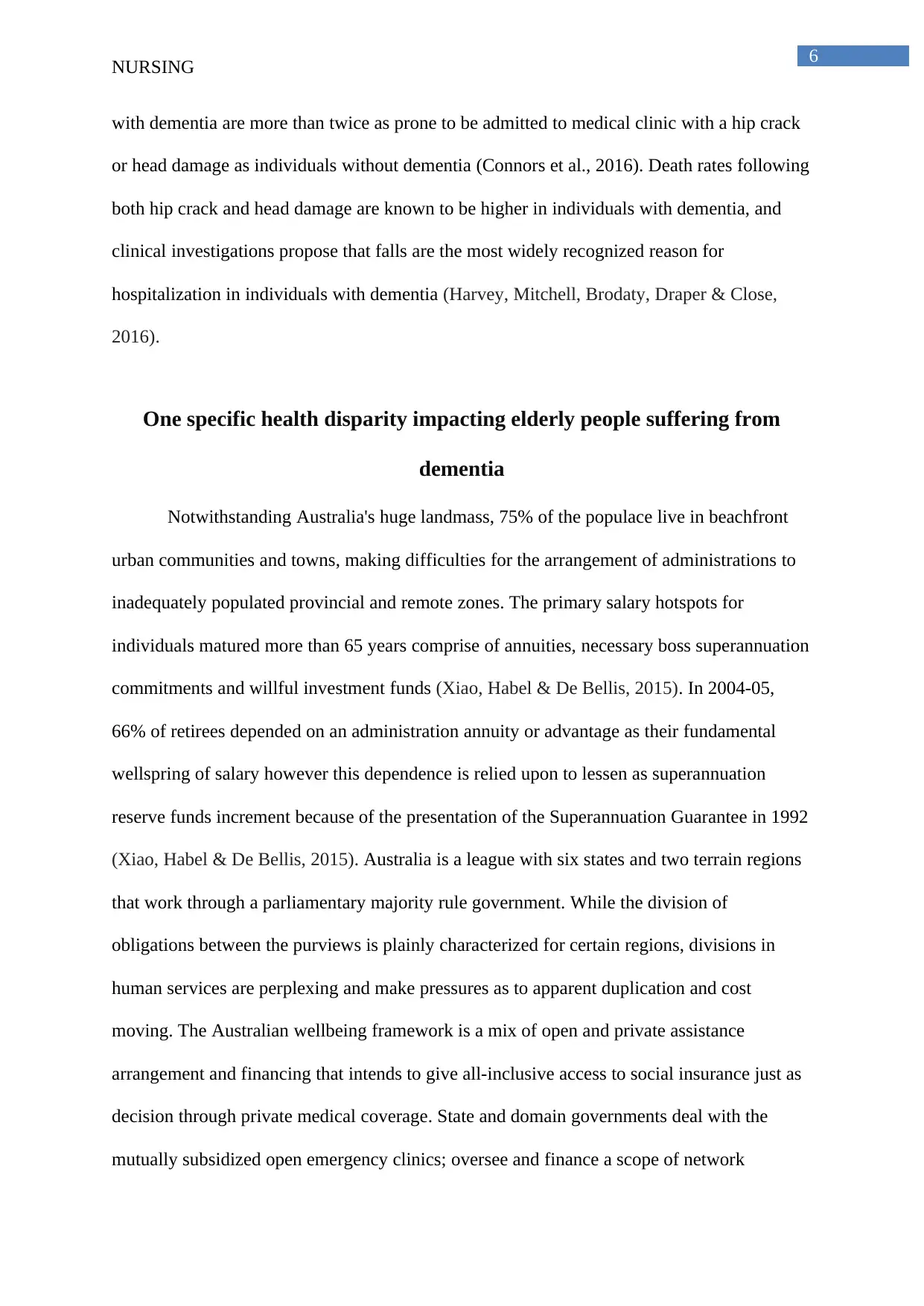
6
NURSING
with dementia are more than twice as prone to be admitted to medical clinic with a hip crack
or head damage as individuals without dementia (Connors et al., 2016). Death rates following
both hip crack and head damage are known to be higher in individuals with dementia, and
clinical investigations propose that falls are the most widely recognized reason for
hospitalization in individuals with dementia (Harvey, Mitchell, Brodaty, Draper & Close,
2016).
One specific health disparity impacting elderly people suffering from
dementia
Notwithstanding Australia's huge landmass, 75% of the populace live in beachfront
urban communities and towns, making difficulties for the arrangement of administrations to
inadequately populated provincial and remote zones. The primary salary hotspots for
individuals matured more than 65 years comprise of annuities, necessary boss superannuation
commitments and willful investment funds (Xiao, Habel & De Bellis, 2015). In 2004-05,
66% of retirees depended on an administration annuity or advantage as their fundamental
wellspring of salary however this dependence is relied upon to lessen as superannuation
reserve funds increment because of the presentation of the Superannuation Guarantee in 1992
(Xiao, Habel & De Bellis, 2015). Australia is a league with six states and two terrain regions
that work through a parliamentary majority rule government. While the division of
obligations between the purviews is plainly characterized for certain regions, divisions in
human services are perplexing and make pressures as to apparent duplication and cost
moving. The Australian wellbeing framework is a mix of open and private assistance
arrangement and financing that intends to give all-inclusive access to social insurance just as
decision through private medical coverage. State and domain governments deal with the
mutually subsidized open emergency clinics; oversee and finance a scope of network
NURSING
with dementia are more than twice as prone to be admitted to medical clinic with a hip crack
or head damage as individuals without dementia (Connors et al., 2016). Death rates following
both hip crack and head damage are known to be higher in individuals with dementia, and
clinical investigations propose that falls are the most widely recognized reason for
hospitalization in individuals with dementia (Harvey, Mitchell, Brodaty, Draper & Close,
2016).
One specific health disparity impacting elderly people suffering from
dementia
Notwithstanding Australia's huge landmass, 75% of the populace live in beachfront
urban communities and towns, making difficulties for the arrangement of administrations to
inadequately populated provincial and remote zones. The primary salary hotspots for
individuals matured more than 65 years comprise of annuities, necessary boss superannuation
commitments and willful investment funds (Xiao, Habel & De Bellis, 2015). In 2004-05,
66% of retirees depended on an administration annuity or advantage as their fundamental
wellspring of salary however this dependence is relied upon to lessen as superannuation
reserve funds increment because of the presentation of the Superannuation Guarantee in 1992
(Xiao, Habel & De Bellis, 2015). Australia is a league with six states and two terrain regions
that work through a parliamentary majority rule government. While the division of
obligations between the purviews is plainly characterized for certain regions, divisions in
human services are perplexing and make pressures as to apparent duplication and cost
moving. The Australian wellbeing framework is a mix of open and private assistance
arrangement and financing that intends to give all-inclusive access to social insurance just as
decision through private medical coverage. State and domain governments deal with the
mutually subsidized open emergency clinics; oversee and finance a scope of network
Paraphrase This Document
Need a fresh take? Get an instant paraphrase of this document with our AI Paraphraser
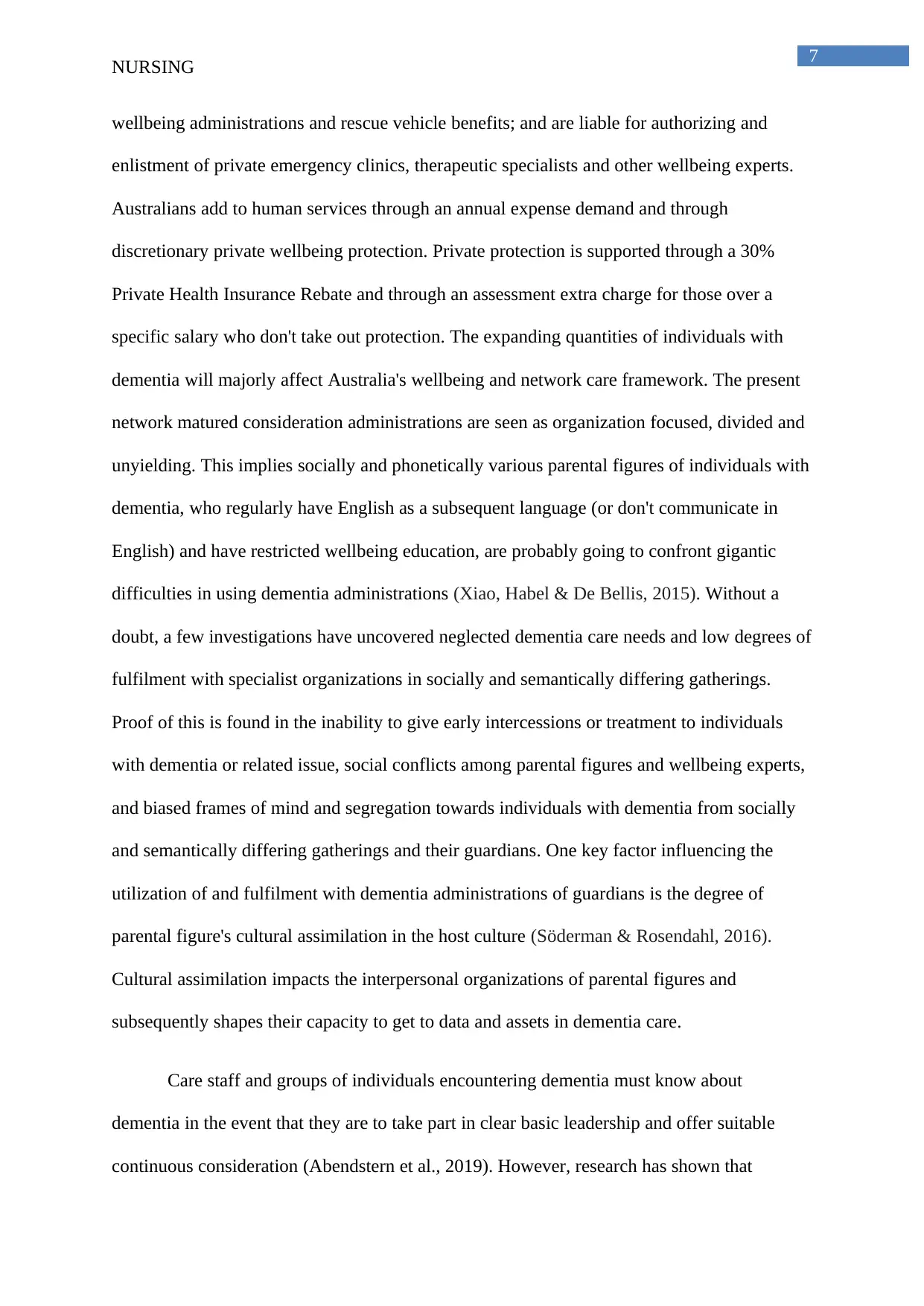
7
NURSING
wellbeing administrations and rescue vehicle benefits; and are liable for authorizing and
enlistment of private emergency clinics, therapeutic specialists and other wellbeing experts.
Australians add to human services through an annual expense demand and through
discretionary private wellbeing protection. Private protection is supported through a 30%
Private Health Insurance Rebate and through an assessment extra charge for those over a
specific salary who don't take out protection. The expanding quantities of individuals with
dementia will majorly affect Australia's wellbeing and network care framework. The present
network matured consideration administrations are seen as organization focused, divided and
unyielding. This implies socially and phonetically various parental figures of individuals with
dementia, who regularly have English as a subsequent language (or don't communicate in
English) and have restricted wellbeing education, are probably going to confront gigantic
difficulties in using dementia administrations (Xiao, Habel & De Bellis, 2015). Without a
doubt, a few investigations have uncovered neglected dementia care needs and low degrees of
fulfilment with specialist organizations in socially and semantically differing gatherings.
Proof of this is found in the inability to give early intercessions or treatment to individuals
with dementia or related issue, social conflicts among parental figures and wellbeing experts,
and biased frames of mind and segregation towards individuals with dementia from socially
and semantically differing gatherings and their guardians. One key factor influencing the
utilization of and fulfilment with dementia administrations of guardians is the degree of
parental figure's cultural assimilation in the host culture (Söderman & Rosendahl, 2016).
Cultural assimilation impacts the interpersonal organizations of parental figures and
subsequently shapes their capacity to get to data and assets in dementia care.
Care staff and groups of individuals encountering dementia must know about
dementia in the event that they are to take part in clear basic leadership and offer suitable
continuous consideration (Abendstern et al., 2019). However, research has shown that
NURSING
wellbeing administrations and rescue vehicle benefits; and are liable for authorizing and
enlistment of private emergency clinics, therapeutic specialists and other wellbeing experts.
Australians add to human services through an annual expense demand and through
discretionary private wellbeing protection. Private protection is supported through a 30%
Private Health Insurance Rebate and through an assessment extra charge for those over a
specific salary who don't take out protection. The expanding quantities of individuals with
dementia will majorly affect Australia's wellbeing and network care framework. The present
network matured consideration administrations are seen as organization focused, divided and
unyielding. This implies socially and phonetically various parental figures of individuals with
dementia, who regularly have English as a subsequent language (or don't communicate in
English) and have restricted wellbeing education, are probably going to confront gigantic
difficulties in using dementia administrations (Xiao, Habel & De Bellis, 2015). Without a
doubt, a few investigations have uncovered neglected dementia care needs and low degrees of
fulfilment with specialist organizations in socially and semantically differing gatherings.
Proof of this is found in the inability to give early intercessions or treatment to individuals
with dementia or related issue, social conflicts among parental figures and wellbeing experts,
and biased frames of mind and segregation towards individuals with dementia from socially
and semantically differing gatherings and their guardians. One key factor influencing the
utilization of and fulfilment with dementia administrations of guardians is the degree of
parental figure's cultural assimilation in the host culture (Söderman & Rosendahl, 2016).
Cultural assimilation impacts the interpersonal organizations of parental figures and
subsequently shapes their capacity to get to data and assets in dementia care.
Care staff and groups of individuals encountering dementia must know about
dementia in the event that they are to take part in clear basic leadership and offer suitable
continuous consideration (Abendstern et al., 2019). However, research has shown that
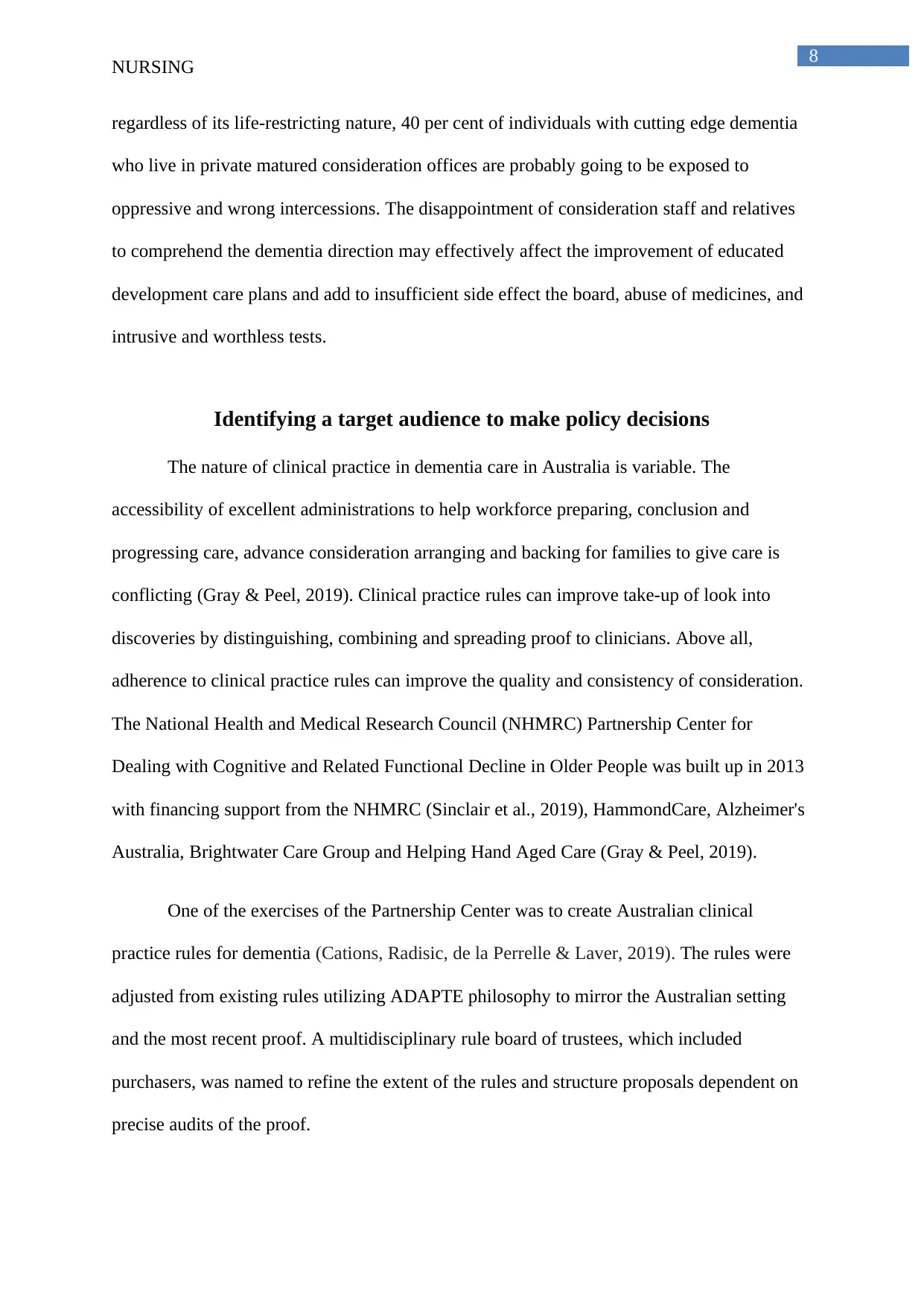
8
NURSING
regardless of its life-restricting nature, 40 per cent of individuals with cutting edge dementia
who live in private matured consideration offices are probably going to be exposed to
oppressive and wrong intercessions. The disappointment of consideration staff and relatives
to comprehend the dementia direction may effectively affect the improvement of educated
development care plans and add to insufficient side effect the board, abuse of medicines, and
intrusive and worthless tests.
Identifying a target audience to make policy decisions
The nature of clinical practice in dementia care in Australia is variable. The
accessibility of excellent administrations to help workforce preparing, conclusion and
progressing care, advance consideration arranging and backing for families to give care is
conflicting (Gray & Peel, 2019). Clinical practice rules can improve take-up of look into
discoveries by distinguishing, combining and spreading proof to clinicians. Above all,
adherence to clinical practice rules can improve the quality and consistency of consideration.
The National Health and Medical Research Council (NHMRC) Partnership Center for
Dealing with Cognitive and Related Functional Decline in Older People was built up in 2013
with financing support from the NHMRC (Sinclair et al., 2019), HammondCare, Alzheimer's
Australia, Brightwater Care Group and Helping Hand Aged Care (Gray & Peel, 2019).
One of the exercises of the Partnership Center was to create Australian clinical
practice rules for dementia (Cations, Radisic, de la Perrelle & Laver, 2019). The rules were
adjusted from existing rules utilizing ADAPTE philosophy to mirror the Australian setting
and the most recent proof. A multidisciplinary rule board of trustees, which included
purchasers, was named to refine the extent of the rules and structure proposals dependent on
precise audits of the proof.
NURSING
regardless of its life-restricting nature, 40 per cent of individuals with cutting edge dementia
who live in private matured consideration offices are probably going to be exposed to
oppressive and wrong intercessions. The disappointment of consideration staff and relatives
to comprehend the dementia direction may effectively affect the improvement of educated
development care plans and add to insufficient side effect the board, abuse of medicines, and
intrusive and worthless tests.
Identifying a target audience to make policy decisions
The nature of clinical practice in dementia care in Australia is variable. The
accessibility of excellent administrations to help workforce preparing, conclusion and
progressing care, advance consideration arranging and backing for families to give care is
conflicting (Gray & Peel, 2019). Clinical practice rules can improve take-up of look into
discoveries by distinguishing, combining and spreading proof to clinicians. Above all,
adherence to clinical practice rules can improve the quality and consistency of consideration.
The National Health and Medical Research Council (NHMRC) Partnership Center for
Dealing with Cognitive and Related Functional Decline in Older People was built up in 2013
with financing support from the NHMRC (Sinclair et al., 2019), HammondCare, Alzheimer's
Australia, Brightwater Care Group and Helping Hand Aged Care (Gray & Peel, 2019).
One of the exercises of the Partnership Center was to create Australian clinical
practice rules for dementia (Cations, Radisic, de la Perrelle & Laver, 2019). The rules were
adjusted from existing rules utilizing ADAPTE philosophy to mirror the Australian setting
and the most recent proof. A multidisciplinary rule board of trustees, which included
purchasers, was named to refine the extent of the rules and structure proposals dependent on
precise audits of the proof.
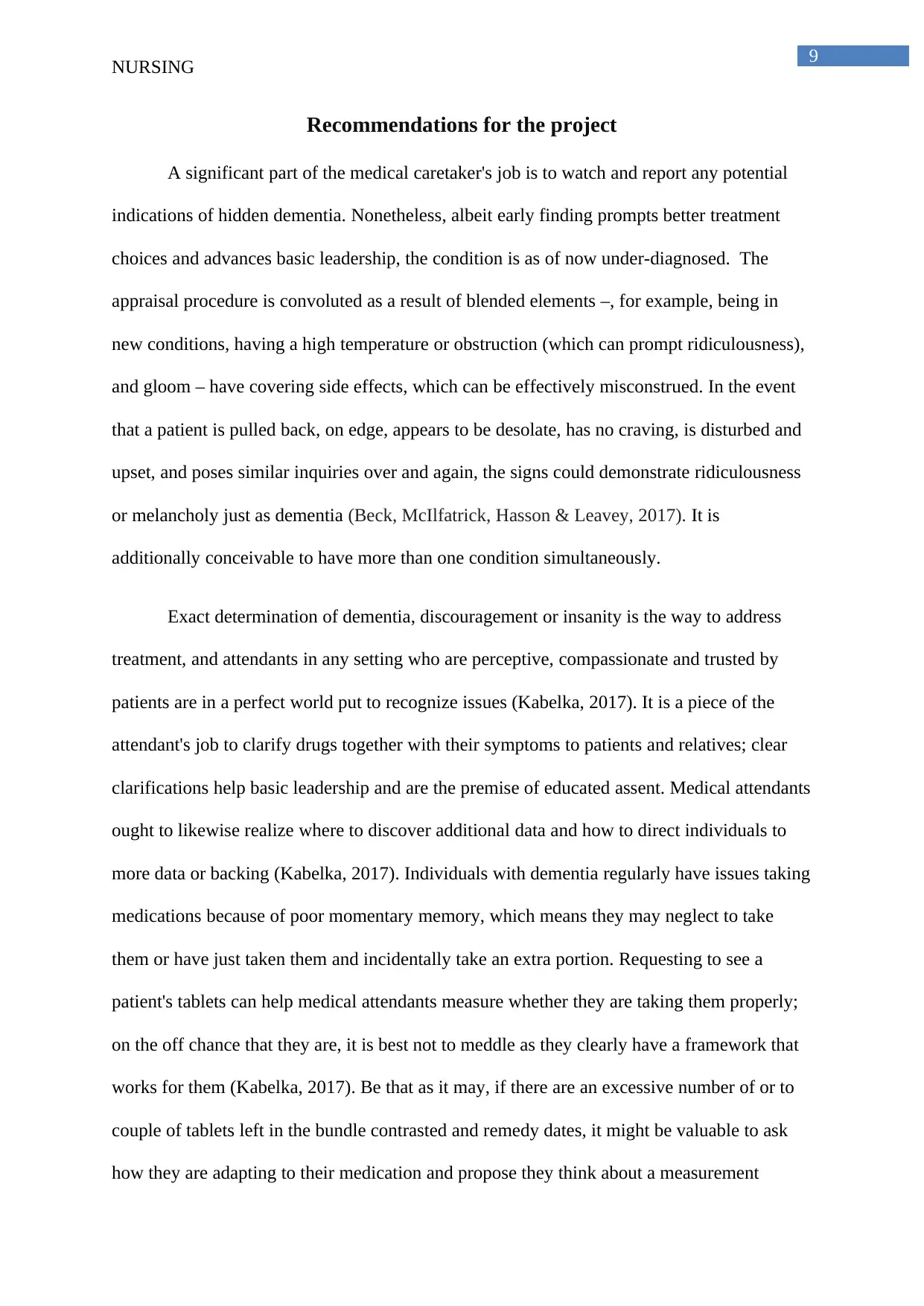
9
NURSING
Recommendations for the project
A significant part of the medical caretaker's job is to watch and report any potential
indications of hidden dementia. Nonetheless, albeit early finding prompts better treatment
choices and advances basic leadership, the condition is as of now under-diagnosed. The
appraisal procedure is convoluted as a result of blended elements –, for example, being in
new conditions, having a high temperature or obstruction (which can prompt ridiculousness),
and gloom – have covering side effects, which can be effectively misconstrued. In the event
that a patient is pulled back, on edge, appears to be desolate, has no craving, is disturbed and
upset, and poses similar inquiries over and again, the signs could demonstrate ridiculousness
or melancholy just as dementia (Beck, McIlfatrick, Hasson & Leavey, 2017). It is
additionally conceivable to have more than one condition simultaneously.
Exact determination of dementia, discouragement or insanity is the way to address
treatment, and attendants in any setting who are perceptive, compassionate and trusted by
patients are in a perfect world put to recognize issues (Kabelka, 2017). It is a piece of the
attendant's job to clarify drugs together with their symptoms to patients and relatives; clear
clarifications help basic leadership and are the premise of educated assent. Medical attendants
ought to likewise realize where to discover additional data and how to direct individuals to
more data or backing (Kabelka, 2017). Individuals with dementia regularly have issues taking
medications because of poor momentary memory, which means they may neglect to take
them or have just taken them and incidentally take an extra portion. Requesting to see a
patient's tablets can help medical attendants measure whether they are taking them properly;
on the off chance that they are, it is best not to meddle as they clearly have a framework that
works for them (Kabelka, 2017). Be that as it may, if there are an excessive number of or to
couple of tablets left in the bundle contrasted and remedy dates, it might be valuable to ask
how they are adapting to their medication and propose they think about a measurement
NURSING
Recommendations for the project
A significant part of the medical caretaker's job is to watch and report any potential
indications of hidden dementia. Nonetheless, albeit early finding prompts better treatment
choices and advances basic leadership, the condition is as of now under-diagnosed. The
appraisal procedure is convoluted as a result of blended elements –, for example, being in
new conditions, having a high temperature or obstruction (which can prompt ridiculousness),
and gloom – have covering side effects, which can be effectively misconstrued. In the event
that a patient is pulled back, on edge, appears to be desolate, has no craving, is disturbed and
upset, and poses similar inquiries over and again, the signs could demonstrate ridiculousness
or melancholy just as dementia (Beck, McIlfatrick, Hasson & Leavey, 2017). It is
additionally conceivable to have more than one condition simultaneously.
Exact determination of dementia, discouragement or insanity is the way to address
treatment, and attendants in any setting who are perceptive, compassionate and trusted by
patients are in a perfect world put to recognize issues (Kabelka, 2017). It is a piece of the
attendant's job to clarify drugs together with their symptoms to patients and relatives; clear
clarifications help basic leadership and are the premise of educated assent. Medical attendants
ought to likewise realize where to discover additional data and how to direct individuals to
more data or backing (Kabelka, 2017). Individuals with dementia regularly have issues taking
medications because of poor momentary memory, which means they may neglect to take
them or have just taken them and incidentally take an extra portion. Requesting to see a
patient's tablets can help medical attendants measure whether they are taking them properly;
on the off chance that they are, it is best not to meddle as they clearly have a framework that
works for them (Kabelka, 2017). Be that as it may, if there are an excessive number of or to
couple of tablets left in the bundle contrasted and remedy dates, it might be valuable to ask
how they are adapting to their medication and propose they think about a measurement
Secure Best Marks with AI Grader
Need help grading? Try our AI Grader for instant feedback on your assignments.
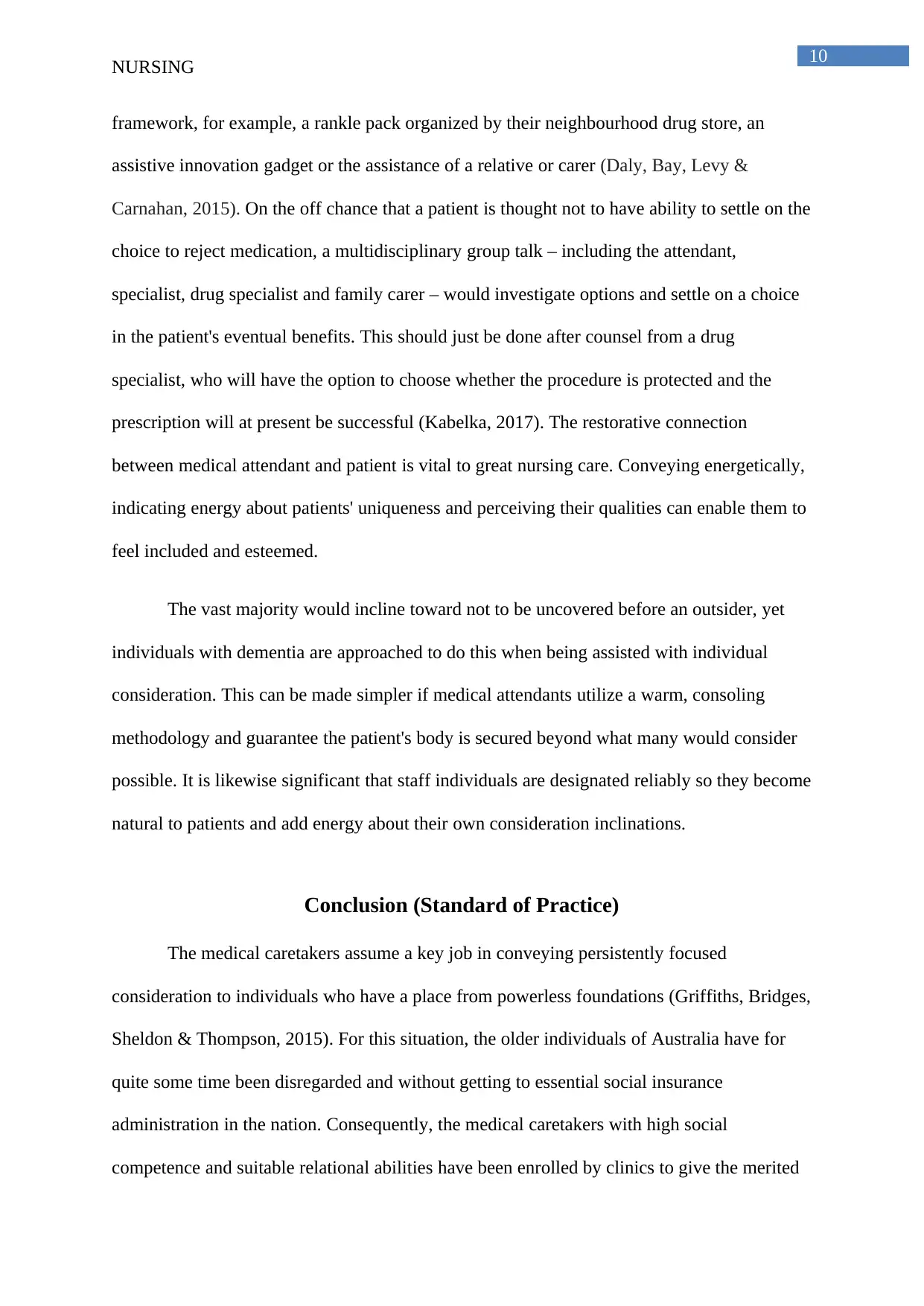
10
NURSING
framework, for example, a rankle pack organized by their neighbourhood drug store, an
assistive innovation gadget or the assistance of a relative or carer (Daly, Bay, Levy &
Carnahan, 2015). On the off chance that a patient is thought not to have ability to settle on the
choice to reject medication, a multidisciplinary group talk – including the attendant,
specialist, drug specialist and family carer – would investigate options and settle on a choice
in the patient's eventual benefits. This should just be done after counsel from a drug
specialist, who will have the option to choose whether the procedure is protected and the
prescription will at present be successful (Kabelka, 2017). The restorative connection
between medical attendant and patient is vital to great nursing care. Conveying energetically,
indicating energy about patients' uniqueness and perceiving their qualities can enable them to
feel included and esteemed.
The vast majority would incline toward not to be uncovered before an outsider, yet
individuals with dementia are approached to do this when being assisted with individual
consideration. This can be made simpler if medical attendants utilize a warm, consoling
methodology and guarantee the patient's body is secured beyond what many would consider
possible. It is likewise significant that staff individuals are designated reliably so they become
natural to patients and add energy about their own consideration inclinations.
Conclusion (Standard of Practice)
The medical caretakers assume a key job in conveying persistently focused
consideration to individuals who have a place from powerless foundations (Griffiths, Bridges,
Sheldon & Thompson, 2015). For this situation, the older individuals of Australia have for
quite some time been disregarded and without getting to essential social insurance
administration in the nation. Consequently, the medical caretakers with high social
competence and suitable relational abilities have been enrolled by clinics to give the merited
NURSING
framework, for example, a rankle pack organized by their neighbourhood drug store, an
assistive innovation gadget or the assistance of a relative or carer (Daly, Bay, Levy &
Carnahan, 2015). On the off chance that a patient is thought not to have ability to settle on the
choice to reject medication, a multidisciplinary group talk – including the attendant,
specialist, drug specialist and family carer – would investigate options and settle on a choice
in the patient's eventual benefits. This should just be done after counsel from a drug
specialist, who will have the option to choose whether the procedure is protected and the
prescription will at present be successful (Kabelka, 2017). The restorative connection
between medical attendant and patient is vital to great nursing care. Conveying energetically,
indicating energy about patients' uniqueness and perceiving their qualities can enable them to
feel included and esteemed.
The vast majority would incline toward not to be uncovered before an outsider, yet
individuals with dementia are approached to do this when being assisted with individual
consideration. This can be made simpler if medical attendants utilize a warm, consoling
methodology and guarantee the patient's body is secured beyond what many would consider
possible. It is likewise significant that staff individuals are designated reliably so they become
natural to patients and add energy about their own consideration inclinations.
Conclusion (Standard of Practice)
The medical caretakers assume a key job in conveying persistently focused
consideration to individuals who have a place from powerless foundations (Griffiths, Bridges,
Sheldon & Thompson, 2015). For this situation, the older individuals of Australia have for
quite some time been disregarded and without getting to essential social insurance
administration in the nation. Consequently, the medical caretakers with high social
competence and suitable relational abilities have been enrolled by clinics to give the merited
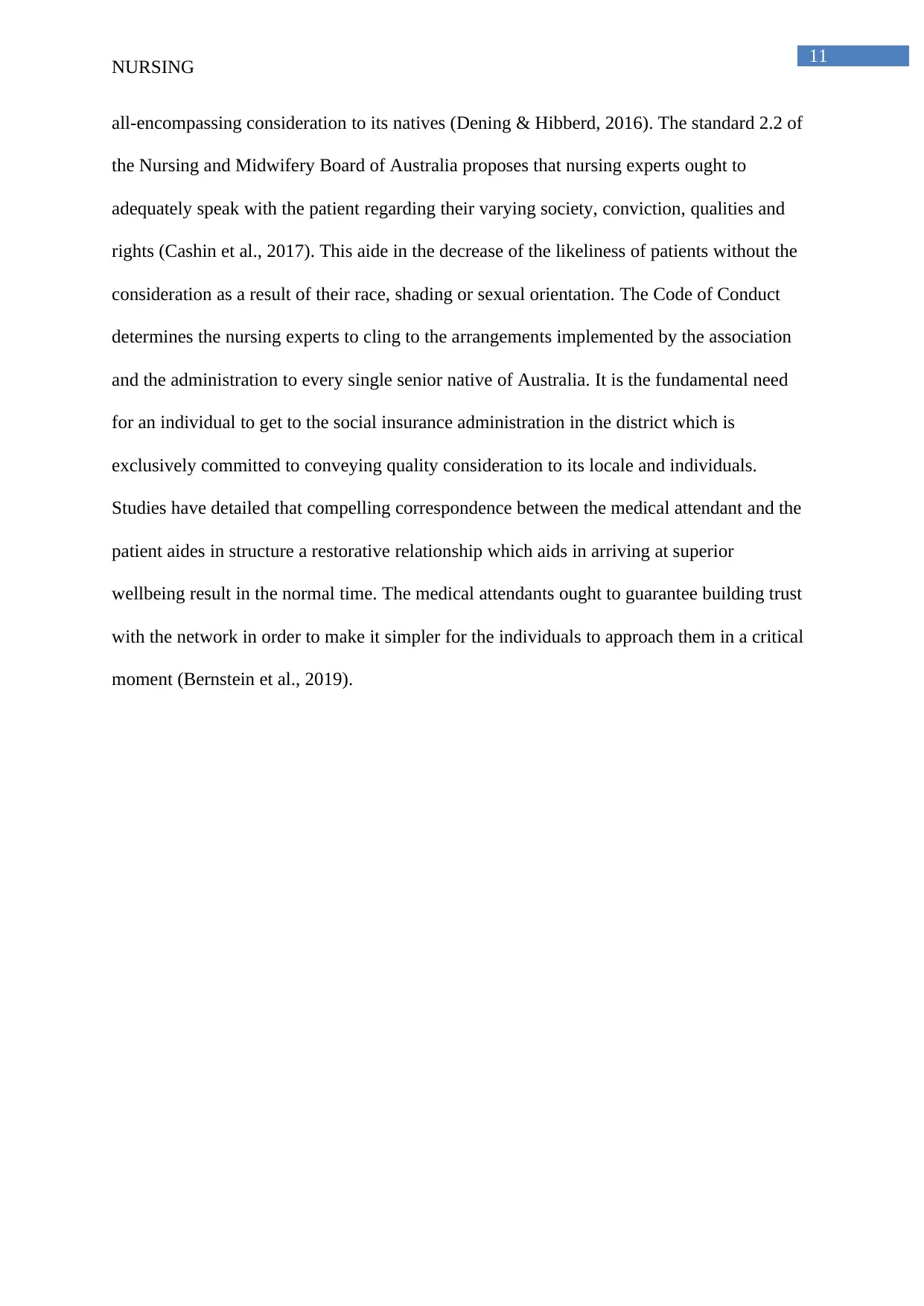
11
NURSING
all-encompassing consideration to its natives (Dening & Hibberd, 2016). The standard 2.2 of
the Nursing and Midwifery Board of Australia proposes that nursing experts ought to
adequately speak with the patient regarding their varying society, conviction, qualities and
rights (Cashin et al., 2017). This aide in the decrease of the likeliness of patients without the
consideration as a result of their race, shading or sexual orientation. The Code of Conduct
determines the nursing experts to cling to the arrangements implemented by the association
and the administration to every single senior native of Australia. It is the fundamental need
for an individual to get to the social insurance administration in the district which is
exclusively committed to conveying quality consideration to its locale and individuals.
Studies have detailed that compelling correspondence between the medical attendant and the
patient aides in structure a restorative relationship which aids in arriving at superior
wellbeing result in the normal time. The medical attendants ought to guarantee building trust
with the network in order to make it simpler for the individuals to approach them in a critical
moment (Bernstein et al., 2019).
NURSING
all-encompassing consideration to its natives (Dening & Hibberd, 2016). The standard 2.2 of
the Nursing and Midwifery Board of Australia proposes that nursing experts ought to
adequately speak with the patient regarding their varying society, conviction, qualities and
rights (Cashin et al., 2017). This aide in the decrease of the likeliness of patients without the
consideration as a result of their race, shading or sexual orientation. The Code of Conduct
determines the nursing experts to cling to the arrangements implemented by the association
and the administration to every single senior native of Australia. It is the fundamental need
for an individual to get to the social insurance administration in the district which is
exclusively committed to conveying quality consideration to its locale and individuals.
Studies have detailed that compelling correspondence between the medical attendant and the
patient aides in structure a restorative relationship which aids in arriving at superior
wellbeing result in the normal time. The medical attendants ought to guarantee building trust
with the network in order to make it simpler for the individuals to approach them in a critical
moment (Bernstein et al., 2019).
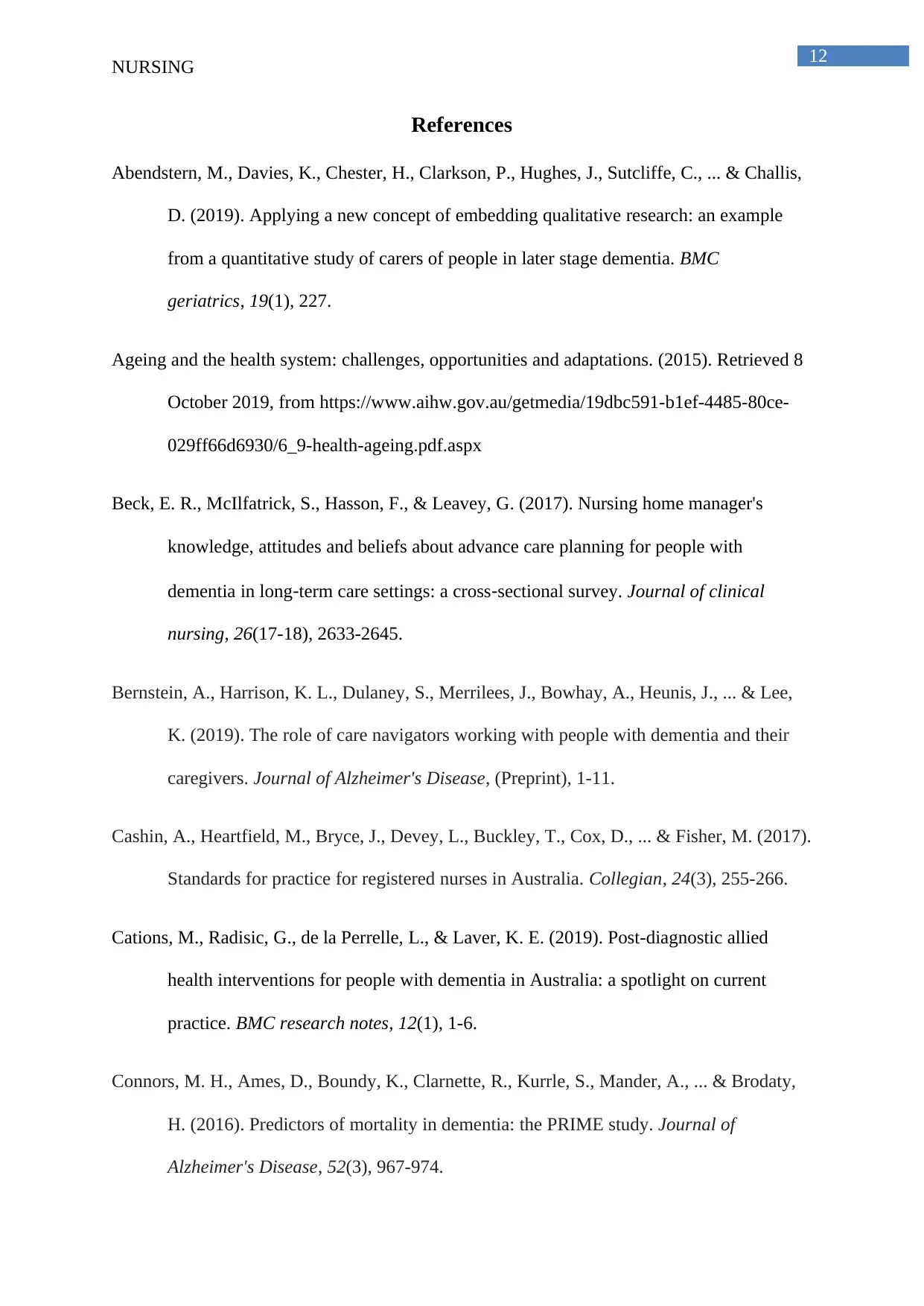
12
NURSING
References
Abendstern, M., Davies, K., Chester, H., Clarkson, P., Hughes, J., Sutcliffe, C., ... & Challis,
D. (2019). Applying a new concept of embedding qualitative research: an example
from a quantitative study of carers of people in later stage dementia. BMC
geriatrics, 19(1), 227.
Ageing and the health system: challenges, opportunities and adaptations. (2015). Retrieved 8
October 2019, from https://www.aihw.gov.au/getmedia/19dbc591-b1ef-4485-80ce-
029ff66d6930/6_9-health-ageing.pdf.aspx
Beck, E. R., McIlfatrick, S., Hasson, F., & Leavey, G. (2017). Nursing home manager's
knowledge, attitudes and beliefs about advance care planning for people with
dementia in long‐term care settings: a cross‐sectional survey. Journal of clinical
nursing, 26(17-18), 2633-2645.
Bernstein, A., Harrison, K. L., Dulaney, S., Merrilees, J., Bowhay, A., Heunis, J., ... & Lee,
K. (2019). The role of care navigators working with people with dementia and their
caregivers. Journal of Alzheimer's Disease, (Preprint), 1-11.
Cashin, A., Heartfield, M., Bryce, J., Devey, L., Buckley, T., Cox, D., ... & Fisher, M. (2017).
Standards for practice for registered nurses in Australia. Collegian, 24(3), 255-266.
Cations, M., Radisic, G., de la Perrelle, L., & Laver, K. E. (2019). Post-diagnostic allied
health interventions for people with dementia in Australia: a spotlight on current
practice. BMC research notes, 12(1), 1-6.
Connors, M. H., Ames, D., Boundy, K., Clarnette, R., Kurrle, S., Mander, A., ... & Brodaty,
H. (2016). Predictors of mortality in dementia: the PRIME study. Journal of
Alzheimer's Disease, 52(3), 967-974.
NURSING
References
Abendstern, M., Davies, K., Chester, H., Clarkson, P., Hughes, J., Sutcliffe, C., ... & Challis,
D. (2019). Applying a new concept of embedding qualitative research: an example
from a quantitative study of carers of people in later stage dementia. BMC
geriatrics, 19(1), 227.
Ageing and the health system: challenges, opportunities and adaptations. (2015). Retrieved 8
October 2019, from https://www.aihw.gov.au/getmedia/19dbc591-b1ef-4485-80ce-
029ff66d6930/6_9-health-ageing.pdf.aspx
Beck, E. R., McIlfatrick, S., Hasson, F., & Leavey, G. (2017). Nursing home manager's
knowledge, attitudes and beliefs about advance care planning for people with
dementia in long‐term care settings: a cross‐sectional survey. Journal of clinical
nursing, 26(17-18), 2633-2645.
Bernstein, A., Harrison, K. L., Dulaney, S., Merrilees, J., Bowhay, A., Heunis, J., ... & Lee,
K. (2019). The role of care navigators working with people with dementia and their
caregivers. Journal of Alzheimer's Disease, (Preprint), 1-11.
Cashin, A., Heartfield, M., Bryce, J., Devey, L., Buckley, T., Cox, D., ... & Fisher, M. (2017).
Standards for practice for registered nurses in Australia. Collegian, 24(3), 255-266.
Cations, M., Radisic, G., de la Perrelle, L., & Laver, K. E. (2019). Post-diagnostic allied
health interventions for people with dementia in Australia: a spotlight on current
practice. BMC research notes, 12(1), 1-6.
Connors, M. H., Ames, D., Boundy, K., Clarnette, R., Kurrle, S., Mander, A., ... & Brodaty,
H. (2016). Predictors of mortality in dementia: the PRIME study. Journal of
Alzheimer's Disease, 52(3), 967-974.
Paraphrase This Document
Need a fresh take? Get an instant paraphrase of this document with our AI Paraphraser
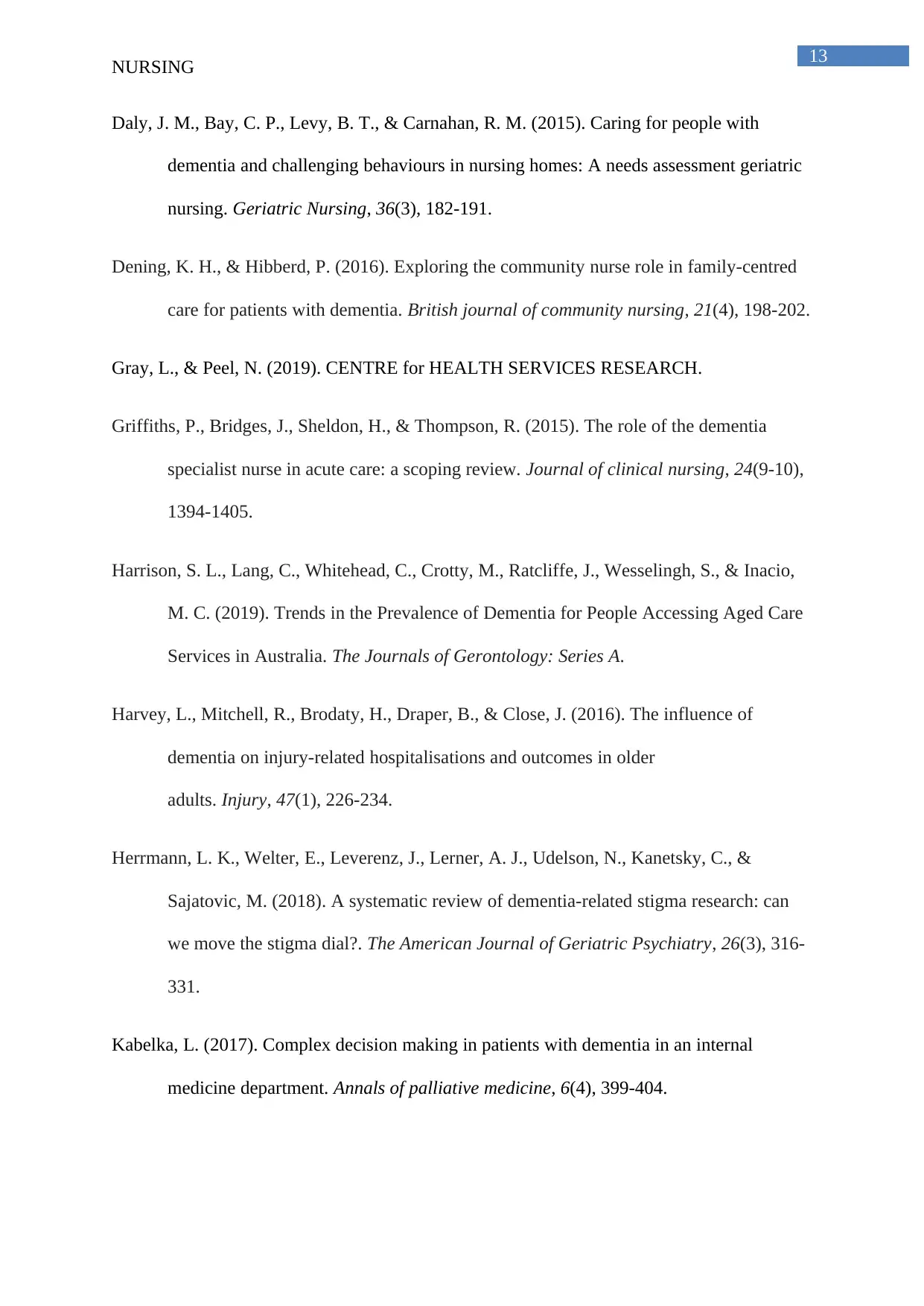
13
NURSING
Daly, J. M., Bay, C. P., Levy, B. T., & Carnahan, R. M. (2015). Caring for people with
dementia and challenging behaviours in nursing homes: A needs assessment geriatric
nursing. Geriatric Nursing, 36(3), 182-191.
Dening, K. H., & Hibberd, P. (2016). Exploring the community nurse role in family-centred
care for patients with dementia. British journal of community nursing, 21(4), 198-202.
Gray, L., & Peel, N. (2019). CENTRE for HEALTH SERVICES RESEARCH.
Griffiths, P., Bridges, J., Sheldon, H., & Thompson, R. (2015). The role of the dementia
specialist nurse in acute care: a scoping review. Journal of clinical nursing, 24(9-10),
1394-1405.
Harrison, S. L., Lang, C., Whitehead, C., Crotty, M., Ratcliffe, J., Wesselingh, S., & Inacio,
M. C. (2019). Trends in the Prevalence of Dementia for People Accessing Aged Care
Services in Australia. The Journals of Gerontology: Series A.
Harvey, L., Mitchell, R., Brodaty, H., Draper, B., & Close, J. (2016). The influence of
dementia on injury-related hospitalisations and outcomes in older
adults. Injury, 47(1), 226-234.
Herrmann, L. K., Welter, E., Leverenz, J., Lerner, A. J., Udelson, N., Kanetsky, C., &
Sajatovic, M. (2018). A systematic review of dementia-related stigma research: can
we move the stigma dial?. The American Journal of Geriatric Psychiatry, 26(3), 316-
331.
Kabelka, L. (2017). Complex decision making in patients with dementia in an internal
medicine department. Annals of palliative medicine, 6(4), 399-404.
NURSING
Daly, J. M., Bay, C. P., Levy, B. T., & Carnahan, R. M. (2015). Caring for people with
dementia and challenging behaviours in nursing homes: A needs assessment geriatric
nursing. Geriatric Nursing, 36(3), 182-191.
Dening, K. H., & Hibberd, P. (2016). Exploring the community nurse role in family-centred
care for patients with dementia. British journal of community nursing, 21(4), 198-202.
Gray, L., & Peel, N. (2019). CENTRE for HEALTH SERVICES RESEARCH.
Griffiths, P., Bridges, J., Sheldon, H., & Thompson, R. (2015). The role of the dementia
specialist nurse in acute care: a scoping review. Journal of clinical nursing, 24(9-10),
1394-1405.
Harrison, S. L., Lang, C., Whitehead, C., Crotty, M., Ratcliffe, J., Wesselingh, S., & Inacio,
M. C. (2019). Trends in the Prevalence of Dementia for People Accessing Aged Care
Services in Australia. The Journals of Gerontology: Series A.
Harvey, L., Mitchell, R., Brodaty, H., Draper, B., & Close, J. (2016). The influence of
dementia on injury-related hospitalisations and outcomes in older
adults. Injury, 47(1), 226-234.
Herrmann, L. K., Welter, E., Leverenz, J., Lerner, A. J., Udelson, N., Kanetsky, C., &
Sajatovic, M. (2018). A systematic review of dementia-related stigma research: can
we move the stigma dial?. The American Journal of Geriatric Psychiatry, 26(3), 316-
331.
Kabelka, L. (2017). Complex decision making in patients with dementia in an internal
medicine department. Annals of palliative medicine, 6(4), 399-404.
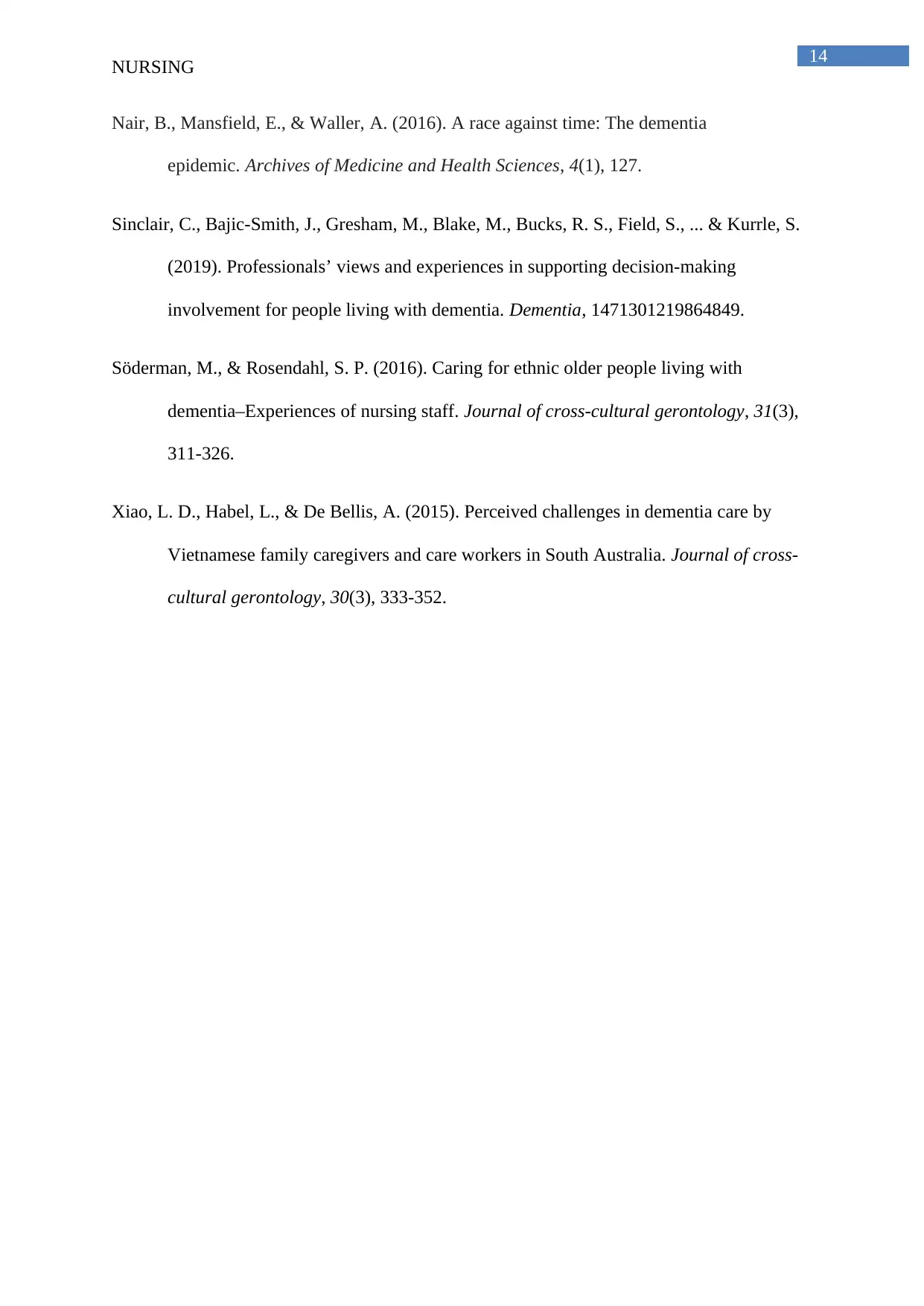
14
NURSING
Nair, B., Mansfield, E., & Waller, A. (2016). A race against time: The dementia
epidemic. Archives of Medicine and Health Sciences, 4(1), 127.
Sinclair, C., Bajic-Smith, J., Gresham, M., Blake, M., Bucks, R. S., Field, S., ... & Kurrle, S.
(2019). Professionals’ views and experiences in supporting decision-making
involvement for people living with dementia. Dementia, 1471301219864849.
Söderman, M., & Rosendahl, S. P. (2016). Caring for ethnic older people living with
dementia–Experiences of nursing staff. Journal of cross-cultural gerontology, 31(3),
311-326.
Xiao, L. D., Habel, L., & De Bellis, A. (2015). Perceived challenges in dementia care by
Vietnamese family caregivers and care workers in South Australia. Journal of cross-
cultural gerontology, 30(3), 333-352.
NURSING
Nair, B., Mansfield, E., & Waller, A. (2016). A race against time: The dementia
epidemic. Archives of Medicine and Health Sciences, 4(1), 127.
Sinclair, C., Bajic-Smith, J., Gresham, M., Blake, M., Bucks, R. S., Field, S., ... & Kurrle, S.
(2019). Professionals’ views and experiences in supporting decision-making
involvement for people living with dementia. Dementia, 1471301219864849.
Söderman, M., & Rosendahl, S. P. (2016). Caring for ethnic older people living with
dementia–Experiences of nursing staff. Journal of cross-cultural gerontology, 31(3),
311-326.
Xiao, L. D., Habel, L., & De Bellis, A. (2015). Perceived challenges in dementia care by
Vietnamese family caregivers and care workers in South Australia. Journal of cross-
cultural gerontology, 30(3), 333-352.
1 out of 15
Related Documents
Your All-in-One AI-Powered Toolkit for Academic Success.
+13062052269
info@desklib.com
Available 24*7 on WhatsApp / Email
![[object Object]](/_next/static/media/star-bottom.7253800d.svg)
Unlock your academic potential
© 2024 | Zucol Services PVT LTD | All rights reserved.





